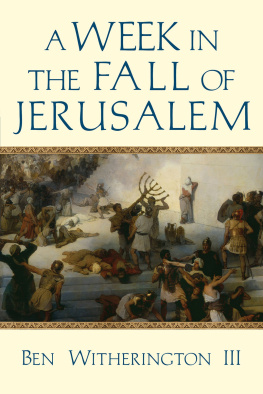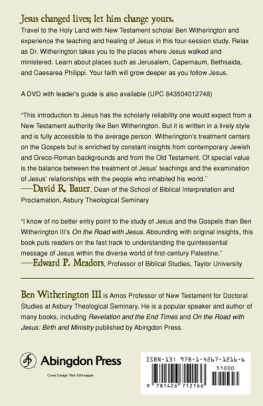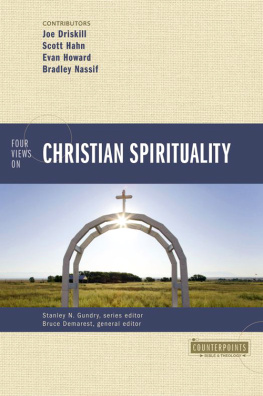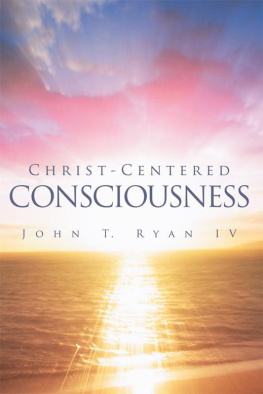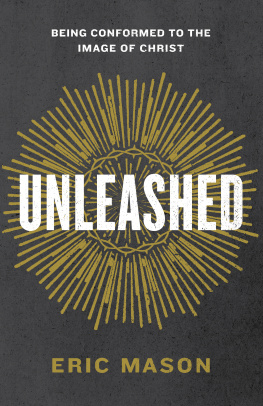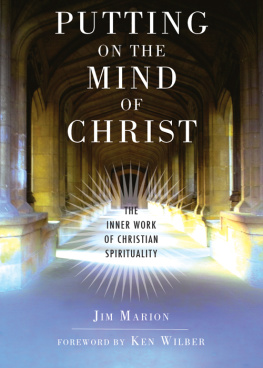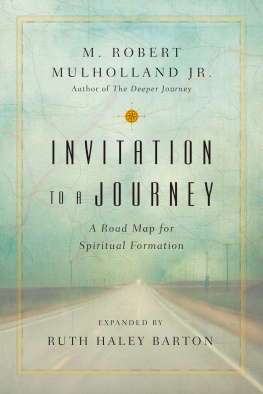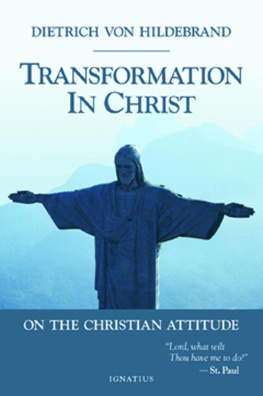A SHARED
CHRISTIAN
LIFE
BEN WITHERINGTON III

A SHARED CHRISTIAN LIFE
Copyright 2012 by Abingdon Press
All rights reserved.
No part of this work may be reproduced or transmitted in any form or by any means, electronic or mechanical, including photocopying and recording, or by any information storage or retrieval system, except as may be expressly permitted by the 1976 Copyright Act or in writing from the publisher. Requests for permission can be addressed to Permissions, The United Methodist Publishing House, P.O. Box 801, 201 Eighth Avenue South, Nashville, TN 37202-0801, or e-mailed to .
This book is printed on acid-free paper.
Cataloging-in-Publication Data has been requested from the Library of Congress.
ISBN 978-1-4267-5317-6
All scripture quotations, unless noted otherwise, are the authors translation.
12 13 14 15 16 17 18 19 20 2110 9 8 7 6 5 4 3 2 1
MANUFACTURED IN THE UNITED STATES OF AMERICA
For Steve Harper upon his retirement. A good friend, a good brother, the first John Wesley Fellow (and the first to retire). I cant wait to see how a tireless servant of the Lord manages to retire. May the Lord bless you and keep you and make his face to shine upon you until you have a holy sun tan!
Contents
INTRODUCTION
FORWARD CHRISTIAN SOLDIERS
John Wesley was getting aggravated with his Moravian friends because of their do-nothing tendencies when it came to grace. They were having some heated discussions in London about the means of grace, and there were some Moravians even arguing that grace happens according to Gods preordained plan and that there was nothing we humans could do to prod God into giving it sooner or laterno spiritual exercises, no fasting, no earnest praying, no taking of the sacramentsNOTHING.
Wesley was completely dissatisfied with their answer that they must just sit in their chairs and wait for the grace of God to descend from above like waiting for God to send the rain (which in London seemed to appear more frequently than grace in these Moravians views). Finally, Wesley threw up his hands and basically said to the Moravians, You should wait actively for the grace of God! Go take the Eucharist! These words came naturally to a man who did his best to take Holy Communion every single day of his life, if possible. He had also urged constant communion on his followers, on the theory that we always could use more grace and presence of God in our lives.
This little story, which is a true story, speaks volumes about John Wesleys approach to what we today call spiritual formation. In many ways, it stands at odds with some of the models of spiritual formation we hear so much about in our eramodels that promote extreme introspection, individual isolation and individualistic seeking, spiritual athleticism of various kinds, and even spiritual navel-gazing of a sort. Sometimes when reading some of this literature, it seems almost as if ordinary Christians are being told get thee to a nunnery if you want to be truly spiritually formed.
What has happened in the age of narcissism and me first is that spiritual formation exercises and inventories have all too often taken on the character and ethos of our age, including the radical individualism of the culture. When you take a spiritual inventory that keeps asking questions about your feelings about God or how close you personally feel to God, there is a good reason to become uneasy. The language and praxis of psychology and psychological counseling have crept into the discussions of spiritual formation as if emotions were some sort of good guide or gauge to the state of someones soul or his or her relationship with God. But in fact, this is often far from the truth.
Your visceral feelings are, more often than not, subject to the whims of your health, your circumstances, how much sleep youve had, whether youve taken your medicine or not, whether you are employed or not, and a thousand other such factors. Feelings, as Eugene Peterson once said, are remarkably unreliable guides to the state of your relationship with God, and are indeed seldom very reliable as guides to the state of your relationship with others.
Think for a minute about the Great Commandmentlove God wholeheartedly and neighbor as self. I remember a day when my wife had a migraine headache and we had company coming. She felt terrible but there she was being a gracious hostess and no one but me knew that she was loving our guests in spite of how she felt. Dont get me wrong; I have nothing against feelings. I am just saying they are not very good litmus tests of where we stand with God. Just because, at a given moment, I dont have warm fuzzy feelings about God doesnt mean that I am, or sense that I am, distant from God! For example, love in the Bible is an action word. It is your ethic, what you do and how you act toward God, others, and self. It is not really meant as a feeling. Doing loving deeds is what the Great Commandment is about. I am rather certain that the greatest loving deed of all time, Jesus dying on the cross for all of us, was not accompanied by warm fuzzy feelings. On the contrary, the story in the Garden of Gethsemane suggests that Jesus faced that prospect with icy dread.
The concern of this little book is to help us get away from certain unhelpful models of spiritual formation and practice our faith in ways that head in a more Wesleyan direction. There are two concerns I want to stress. First, the primary form of spiritual formation in the Wesleyan mode focuses on activities, and more specifically on group activities, and even more specifically on the activities of the body of Christ gatheredactivities like worship, shared teaching or Bible study sessions, fellowship meals and times, taking Holy Communion, and doing works of piety and charity undertaken together. In addition, these activities are meant to edify us but also celebrate Gods presence with us.
I believe that primary spiritual formation happens during the times two or more are gathered, Christ is present as well, and we are all caught up in love and wonder and praise. For example, for a Wesleyan, congregational singing and praying are primary means of spiritual formation, as opposed to someone singing to himself or herself in the shower or in his or her prayer closet. Praying the Lords Prayer together is a means of grace. Saying the Apostles Creed together is a means of grace. Singing the hymns is a means of grace.
Second, spiritual formation in the Wesleyan tradition is not primarily an individuals lonely personal quest for spiritual transcendence and growing closer to God. It is not primarily about looking inward so much as it is about looking outward at creation, at other creatures, and at the Creator. It is not about becoming more self-centered, more self-focused; indeed it is about becoming more self-forgetful. Its about knowing God, and in that quest, as a by-product, one comes to know ones self. Its not about taking Socrates advice to know thyself, much less taking the advice to thine own self be true. There is an important distinction Wesley makes between mere emotions and religious affections, and we will need to explore the differences in due course. Religious affections are different from emotions because they are inspired by the spirit of God, not by normal physical factors or human interactions.
Too often in spiritual formation literature certain kinds of extreme monastic models of piety are held up to the ordinary Christians eye, which, apart from sporadic spiritual retreats, she or he could never live up to or into. Who exactly is capable of praying without ceasing, if by praying one is referring to specific spoken or unspoken petitions to God? If you are not a cloistered monk or a hermit with someone else providing you with food, shelter, and clothing, and with no family responsibilities, this sort of spiritual athleticism is beyond the scope of the life of the everyday or normal Christian. My concern in this study is to talk about spirituality for the



